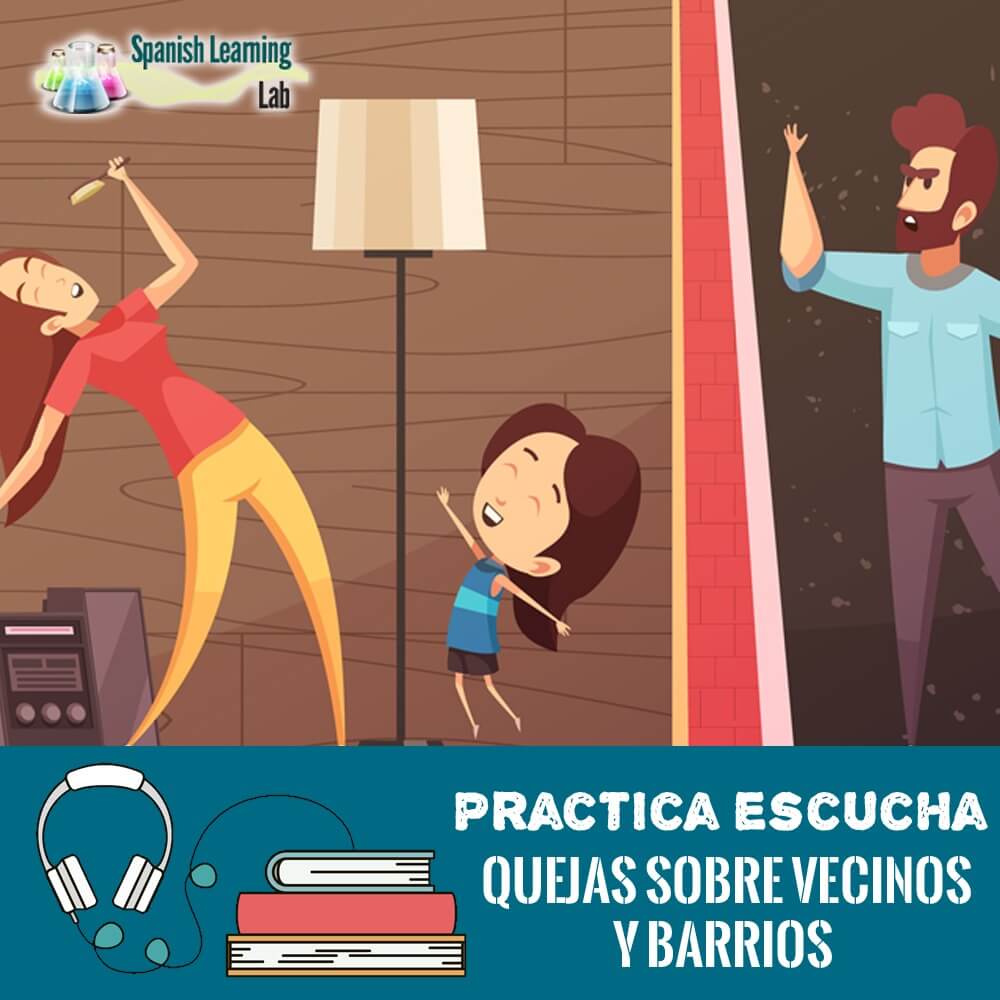Welcome to another lesson for listening practice. This time, we will make use of the vocabulary for things and places in town. We will show you a list of phrases and questions people use when complaining about the neighborhood in Spanish and their neighbors too. You’ll have the chance to practice with two listening activities and interactive quizzes. Let’s start…

Vocabulary Introduction: Complaints about neighbors and the neighborhood in Spanish
First, please listen to the following group of examples introducing part of the vocabulary that people use when they are complaining about their neighbors and neighborhood in Spanish. We will be using different types of tenses including the simple present of some irregular verbs, the past tense and the present perfect too. Please analyze these examples carefully as they will be the basis for both listening activities.
|
El vecino hace fiesta todos los fines de semana. No soporto tanto ruido.
The neighbor has a party every weekend. I can’t stand so much noise.
|
|
Mi vecino tiene demasiadas mascotas. Los perros laten toda la noche y los gatos son extremadamente traviesos.
My neighbor has too many pets. His dogs bark all night long and his cats are extremely naughty.
|
|
Los niños del vecino dañaron las plantas del jardín y hacen muchas travesuras.
The neighbor’s children destroyed the plants in the garden and they do a lot of mischief.
|
|
Los vecinos pusieron la basura frente a nuestra casa, no frente a la de ellos. Voy a quejarme ahorita mismo.
Neighbors put trash in front of our house, not in front of theirs. I’m going to complain right now.
|
|
La vecina hizo un cerco de madera en la parte de atrás tomándose medio metro de nuestro terreno.
The neighbor made a wooden fence in the backyard taking half a meter from our land.
|
|
Alguién ha estacionado un auto frente al garaje de mi casa y ahora no puedo sacar mi carro.
Someone has parked a car in front of my garage and now I can’t get my car out.
|
|
A mis vecinos les gusta husmear y opinar sobre cosas que no les deberían importar. Son muy metiches.
My neighbors like to gosip and comment on things that shouldn’t matter to them. They are very nosy.
|
|
Vivo en un barrio en los suburbios. El sistema de transporte público no es muy bueno. Los buses son muy viejos.
I live in a neighborhood in the suburbs. The public transport system is not very good. The buses are very old.
|
|
En mi barrio, no tenemos suministro de agua permanentemente. Es por eso que debemos almacenar agua en recipientes plásticos.
In my neighborhood, we do not have a permanent water supply. That is why we must store water in plastic containers.
|
|
Las calles de mi barrio están en malas condiciones. El asfalto se ha deteriorado con la lluvia.
The streets in my neighborhood are in poor condition. The asphalt has deteriorated because of the rain.
|
|
Mi barrio es bastante seguro. Sin embargo, los barrios aledaños son inseguros, especialmente por las noches.
My neighborhood is pretty safe. However, the surrounding neighborhoods are unsafe, especially at night.
|
|
Hay varios restaurantes, farmacias y cafés en mi barrio, aunque el supermercado y el hospital están muy lejos.
There are several restaurants, pharmacies and cafes in my neighborhood, although the supermarket and the hospital are far away.
|
|
No hay mucho lugar para parquear en su barrio. Es muy difícil estacionar el auto. Además, la estación de metro está muy lejos y los taxis cuestan un ojo de la cara.
There is not much place to park in your neighborhood. It is very difficult to park the car. Also, the metro station is far away and taxis cost an arm and a leg.
|
|
La estación de policía más cercana es muy pequeña. No puedo realizar todos los trámites que necesito.
The closest police station is very small. I can’t do all the paperwork I need.
|
Listening Activity No. 1: Complaining about neighbors in Spanish
Listening Activity No. 2: Complaining about the Neighborhood in Spanish
We got to the end of this lesson. In both conversations, we included ways to give suggestions in Spanish and some basic comparisons between neighborhoods, besides many other essential topics in the language. Hopefully, you learned a couple of new things with us in this lesson. Keep practicing Spanish! ¡Hasta la próxima!
